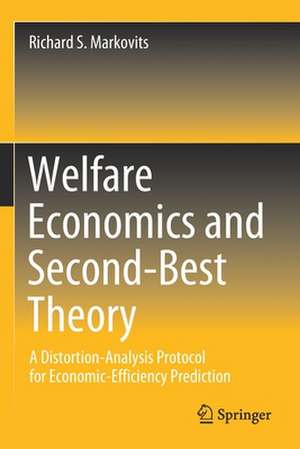Welfare Economics and Second-Best Theory: A Distortion-Analysis Protocol for Economic-Efficiency Prediction
Autor Richard S. Markovitsen Limba Engleză Paperback – 31 mai 2021
This book examines the implications of The General Theory of Second Best for analyzing the economic efficiency of non-government conduct or government policies in an economically efficient way. It develops and legitimates an economically efficient economic-efficiency-analysis protocol with three unique characteristics: First, the protocol focuses separately on each of a wide variety of categories of economic inefficiency, many of which conventional analyses ignore. Second, it analyzes the impact of conduct or policies on each of these categories of economic inefficiency, primarily by predicting the respective conduct’s/policy’s impact on the distortion that the economy’s various Pareto imperfections generate in the profits yielded by the resource allocations associated with the individual categories of economic inefficiency—i.e., on the difference between their profitability and economic efficiency. And third, it is third-best—i.e., it instructs the analyst toexecute a theoretical or empirical research project if and only if the economic-efficiency gains the project is expected to generate by increasing the accuracy of economic-efficiency conclusions exceed the predicted allocative cost of its execution and public financing. The book also uses the protocol to analyze the economic efficiency of specific policies so as to illustrate both how it differs from the protocols that most applied welfare economists continue to use and how its conclusions differ from those produced by standard analysis.
| Toate formatele și edițiile | Preț | Express |
|---|---|---|
| Paperback (1) | 393.13 lei 43-57 zile | |
| Springer International Publishing – 31 mai 2021 | 393.13 lei 43-57 zile | |
| Hardback (1) | 430.13 lei 22-36 zile | +32.13 lei 6-12 zile |
| Springer International Publishing – 31 mai 2020 | 430.13 lei 22-36 zile | +32.13 lei 6-12 zile |
Preț: 393.13 lei
Nou
Puncte Express: 590
Preț estimativ în valută:
75.25€ • 81.76$ • 63.25£
75.25€ • 81.76$ • 63.25£
Carte tipărită la comandă
Livrare economică 21 aprilie-05 mai
Preluare comenzi: 021 569.72.76
Specificații
ISBN-13: 9783030433628
ISBN-10: 3030433625
Pagini: 356
Ilustrații: XXIII, 356 p. 9 illus.
Dimensiuni: 155 x 235 mm
Greutate: 0.54 kg
Ediția:1st ed. 2020
Editura: Springer International Publishing
Colecția Springer
Locul publicării:Cham, Switzerland
ISBN-10: 3030433625
Pagini: 356
Ilustrații: XXIII, 356 p. 9 illus.
Dimensiuni: 155 x 235 mm
Greutate: 0.54 kg
Ediția:1st ed. 2020
Editura: Springer International Publishing
Colecția Springer
Locul publicării:Cham, Switzerland
Cuprins
Introduction to The General Theory of Second Best, Its Central Implications, and the Appropriate Way to Respond to It.- The Economics Profession’s Responses to The General Theory of Second Best: Descriptions and Critiques.- The Concept of “the Impact of a Choice (or Natural Event) on Economic Efficiency”.- “First-Best,” “Second-Best,” and “Third-Best” Definitions, Elaborations, and Other Economists’ Usages.- The Symbols for Various Pareto Imperfections, Private and Allocative Concepts, Categories of Resource-Uses, and Categories of Resource Allocations.- The Vocabulary and Symbols of Distortion Analysis.- Analyses of Various Step-Wise Monopoly Distortions.- The Various Non-Monopoly Step-Wise Private-Benefit, Private-Cost, and Profit Distortions.- Some Negative and Positive Implications of the TBLE Distortion-Analysis Protocol for Economic-Efficiency Prediction/Post-Diction.- The Approach That Would Be TBLE for a Government to Take to Economic-Efficiency Prediction/Post-diction—the Restof the Story.- Conclusion.
Notă biografică
Richard Markovits holds a Ph.D. in economics from the London School of Economics and an L.L.B. from Yale Law School. He currently holds the John B. Connally Chair in Law at the University of Texas Law School. He has taught at several other law schools and economics faculties in both the United States and Germany. From 1981-1983, he was Co-Director of the Centre for Socio-Legal Studies at Wolfson College, Oxford. His research chiefly focuses on Welfare Economics, Industrial Organization, Jurisprudence, and Constitutional Law.
Textul de pe ultima copertă
This book examines the implications of The General Theory of Second Best for analyzing the economic efficiency of non-government conduct or government policies in an economically efficient way. It develops and legitimates an economically efficient economic-efficiency-analysis protocol with three unique characteristics: First, the protocol focuses separately on each of a wide variety of categories of economic inefficiency, many of which conventional analyses ignore. Second, it analyzes the impact of conduct or policies on each of these categories of economic inefficiency, primarily by predicting the respective conduct’s/policy’s impact on the distortion that the economy’s various Pareto imperfections generate in the profits yielded by the resource allocations associated with the individual categories of economic inefficiency—i.e., on the difference between their profitability and economic efficiency. And third, it is third-best—i.e., it instructs the analyst to execute a theoretical or empirical research project if and only if the economic-efficiency gains the project is expected to generate by increasing the accuracy of economic-efficiency conclusions exceed the predicted allocative cost of its execution and public financing. The book also uses the protocol to analyze the economic efficiency of specific policies so as to illustrate both how it differs from the protocols that most applied welfare economists continue to use and how its conclusions differ from those produced by standard analysis.
Caracteristici
Develops and legitimates a new protocol for economic-efficiency analysis Investigates the implications of the General Theory of Second Best for economic-efficiency analysis Illustrates how its third-best protocol differs from the various protocols economists currently use
